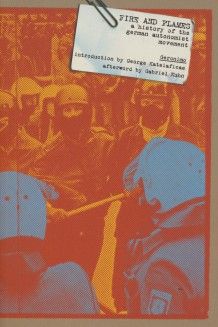Book Review: Fire and Flames: A History of the German Autonomist Movement
BLOG POST posted on Septembre 24, 2012 by Zig Zag
by Geronimo, PM Press, Oakland 2012
Review by Zig Zag
Back when I was first becoming involved in the North American anarchist movement, in the late 1980s, the W. German Autonomists were to us what the Greek anarchists are to today's generation of militants: a source of new ideas, tactics, slogans, and above all inspiration.
I worked with comrades that translated texts from German, including communiques and discussion papers, with the hope of spreading Autonomist ideas and methods throughout N. America. This included Resistance (published in Vancouver) and Arm the Spirit (published in Toronto). By 1992, in fact, there was already a copy of Fire and Flames translated which we distributed and planned on one day publishing.
What was perhaps most inspiring about the W. German Autonomists was their power as a radical force in that country. Black blocs were a regular practise, frequently clashing with riot cops in the streets, from occupied buildings (such as the Hafenstraase), or in the forests surrounding the construction sites of industrial projects (especially nuclear plants). Clandestine groups proliferated, carrying out hundreds of low-level sabotage attacks each year (i.e., Autonomous Cells, Militant Cells, etc.), alongside “higher level” actions carried out by urban guerrilla groups such as the Revolutionary Cells, Rote Zora, and Red Army Faction.
Originally published in Germany in 1990, Fire and Flames is now considered a classic history of the Autonomist movement up to that time. Until now, one of the primary English language accounts of this radical resistance movement has been the writings of George Katsiaficas, a university professor (see The Subversion of Politics). Now an account written by an actual participant is available in English, thanks to Oakland's PM Press.
Writing under the pseudonym 'Geronimo', the author traces the movement's origins from Italy, during massive revolts in the 1960s and '70s involving primarily students and workers (where it was referred to as Autonomia), and the New Left that emerged in W. Germany at this time. He also provides historical context of the situation in West Germany during this same period, and how elements of the anarchist, squatting, feminist, and anti-nuclear movements adopted the theories and practise of autonomy from Italian comrades.
Unlike Katsiaficas' more academic writing, Geronimo's account of the movement's history and development is not that of a professional writer but of an active participant. He presents this history in a highly readable and accessible manner, with short sections devoted to particular campaigns that had considerable impacts on both the movement and W. German society (i.e., the anti-nuclear, squatting, and urban guerrilla struggles).
Included in this history is the development of street fighting techniques from the 1970s to the black bloc tactic of the 1980s (a tactic that first emerged in W. Germany), a fact that led to W. German cops becoming some of the most experienced in riot control in all of Western Europe. There are also accounts of the inherent conflicts with social democrats, liberal pacifists, etc. during campaigns and mobilizations. Along with the text are numerous graphics, photos, and posters from the movement.
According to Edition ID Archiv, a German radical publisher, “The target audience is not the academic middle-class with passive sympathies for rioting, nor the all-knowing critical critics, but the activists of a young generation.”
One of the reasons myself and other comrades placed so much focus on W. German radical resistance in the 1980s was the basic similarities to the US and Canada. The Autonomists provided an example of organizing resistance in an advanced industrialized nation-state, and they did so with an impact. The black bloc may be one of the more obvious examples, but there are many other lessons to be drawn from the W. German Autonomist movement. For these reasons I highly recommend that all radicals acquire this book and study it.
Fire and Flames is available from PM Press
In Canada, you can order the book from Kersplebedeb
The site for the Vancouver local of The Media Co-op has been archived and will no longer be updated. Please visit the main Media Co-op website to learn more about the organization.
